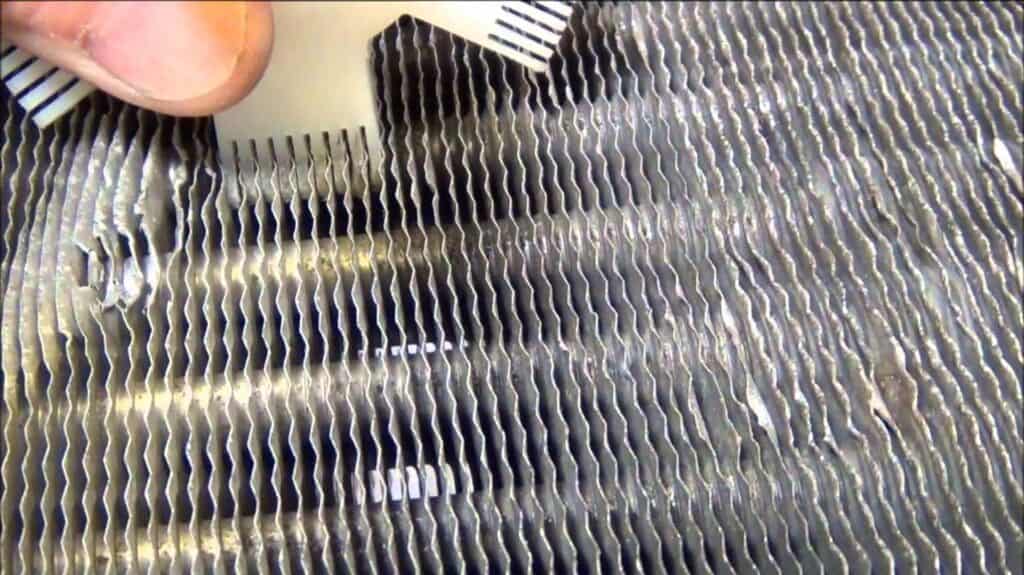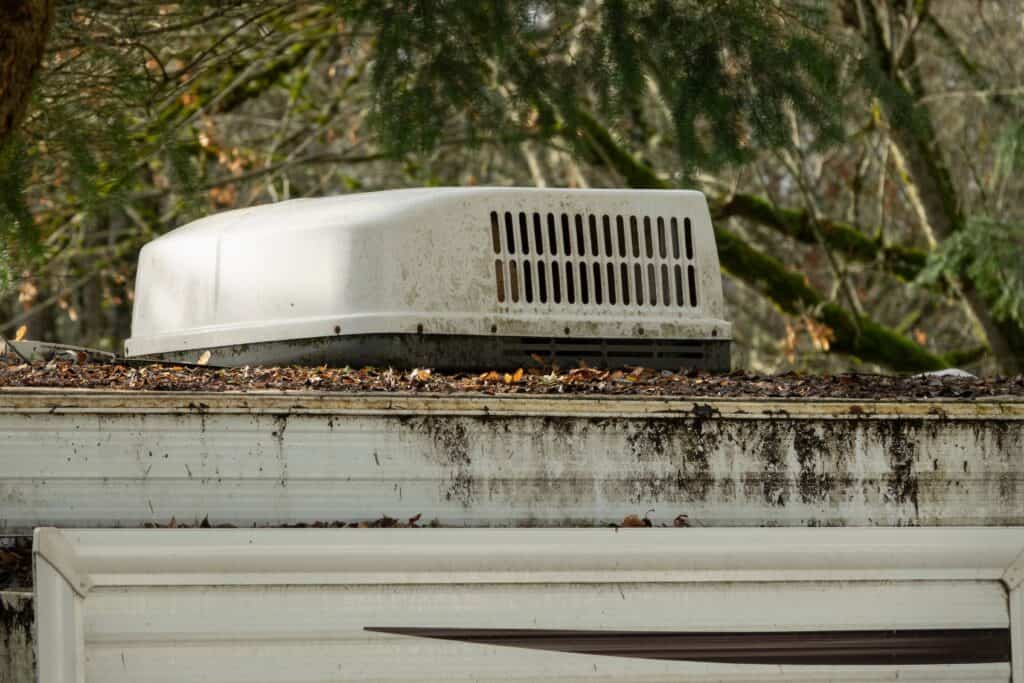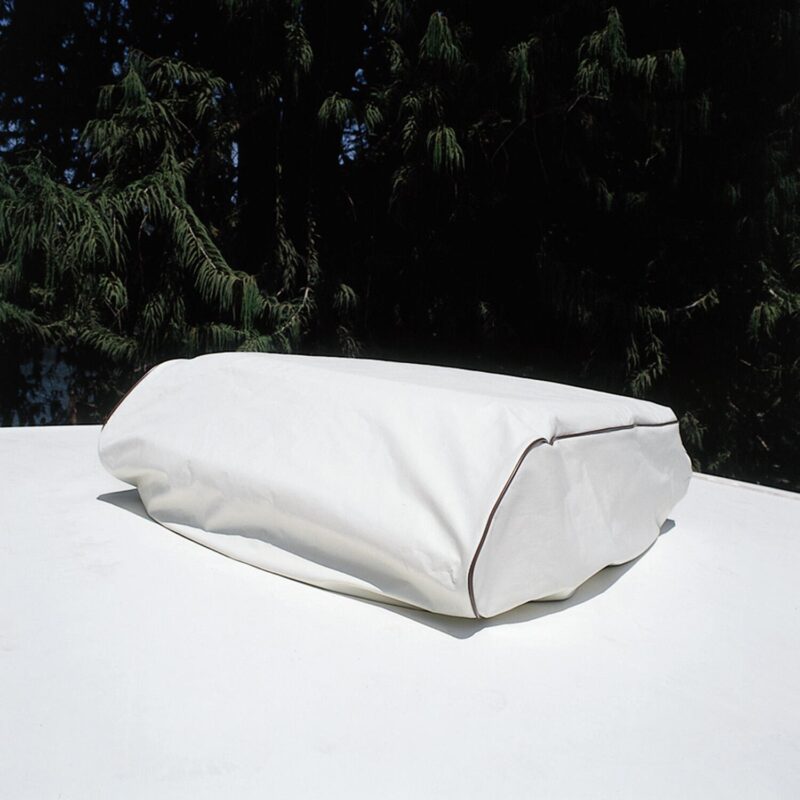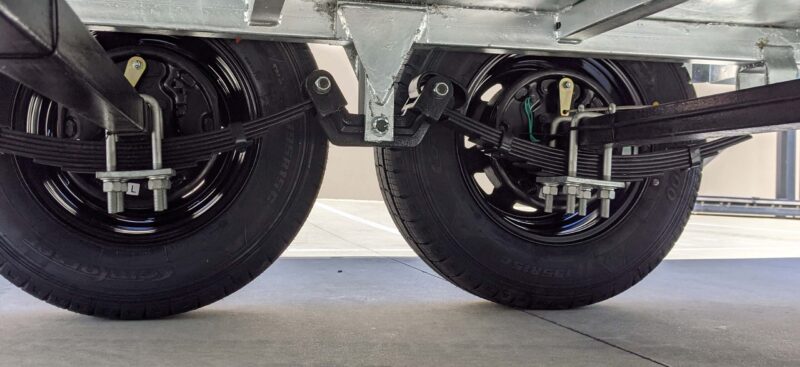We know a few RV techs and have seen firsthand how dirty RV A/C units can become over time. Once, an RV Tech showed me a decayed frog stuck inside an A/C unit he was cleaning. So it made us both wonder if you need an RV Air conditioner cover to keep your A/C clean when not in use.
Your RV air conditioner is one of the more important appliances on your rig. It keeps you cool in the summer and helps with ventilation and air movement. Properly caring for your RV air conditioner is the key to ensuring that it lasts as long as possible. Besides regular maintenance, an RV air conditioner cover is a great way to protect this essential appliance.
There are many air conditioner covers on the market for RVs. This can make shopping for a cover overwhelming and time-consuming. This time expense may make you wonder if investing in an air conditioner cover is worth the effort. To help you work through this process, we have put together our thoughts on air conditioner covers and why they are so important.
What Is An RV Air Conditioner Cover?
RV air conditioner covers are accessories that are used to protect your RV air conditioner from damage or the elements when it is not in use.
There are a lot of different types of air conditioner covers for your RV. They come in various styles, materials, and sizes to fit various RV air conditioner models or brands.
The most common covers are made from vinyl and use elastic or snaps to secure around the RV A/C unit.
Advantages Of RV A/C Covers
If you currently do not have a cover for your RV air conditioner, there are some real advantages to investing in one. Most RV owners invest in simple covers for use during storage.
During storage or when your air conditioner is not in use, dirt, leaves, precipitation, and other debris can blow into your air conditioner unit. Debris in your RV air conditioner will need to be removed before you can use it. The same goes for insect and rodent pests. RV air conditioners can be a really inviting space for mice, bees, wasps, and other small creatures.
An RV air conditioner cover will hide the little spaces where unwanted debris and creatures find their way into the A/C unit. Not only does this protect the interior of your air conditioner from damage, but it also reduces the time you spend cleaning out the unit.
The other advantage of using an RV air conditioner cover is that it protects the housing and cooling fins. Cooling fins can easily be bent by flying debris. A simple cover can provide just enough protection to keep fins from being bent or damaged.

An RV air conditioner cover is also useful for keeping UV rays from damaging the plastic housing of your air conditioner. Plastic becomes brittle when exposed to the sun and elements. Keeping a cover on your air conditioner when it is not in use significantly extends the life of the air conditioner’s housing.
Disadvantages Of RV Air Conditioner Covers
An RV air conditioner cover is a great accessory. Except when it is not. There are some disadvantages that you will need to ponder before you invest in one for your RV.
First, you cannot run your air conditioner with the cover on. This means you must climb on top of your RV and remove the cover. This may not be a task that all RV owners want to undertake, especially if you have a fear of heights or do not feel comfortable on a ladder.
Speaking of removing the air conditioner cover, you will almost always have to do this when driving. You will need to remove a soft cover before traveling. The wind will tear it up or cause it to blow off. However, hard plastic covers can be left on if you are willing to make a more substantial monetary investment.
The other downfall of RV air conditioner covers is that they can discolor the plastic housing of the air conditioner. This tends to happen with darker-colored covers, particularly if they are left in place for an extended period of time.
Can You Drive With The A/C Cover In Place?
Unless your air conditioner cover is hard plastic and is intended to be used while traveling, you should never drive with your RV air conditioner cover in place.
Soft air conditioner covers become a kite or balloon if left on while driving. They fill with air and can become damaged or blow off the air conditioner. For you, this is an inconvenience and, honestly, a waste of your hard-earned dollars.
But for the people traveling behind you, a flying air conditioner cover can be dangerous. Ensure that before you hit the road, you remove air conditioner covers not designed for travel.
Do You Need An RV Air Conditioner Cover?

An RV air conditioner cover is not a must-have accessory for your RV. However, this is an accessory that can provide a world of benefits for a low price.
Not only can a cover extend the life of your air conditioner, but it is also a cheap way to insure against other issues, such as pests, water damage, and poor air quality in your RV.
How Much Are RV A/C Covers?
The funny thing about RV air conditioner covers is the substantial price difference between soft and hard cover options. Basic nylon or vinyl covers that have a universal fit can range in price between $20 and $40.
Though relatively affordable, the cost savings you can achieve with a basic RV air conditioner cover in maintenance and repairs makes them an even greater value.
If you are looking to invest in a more substantial cover that you can leave attached when traveling, you’ll be investing in a hard plastic cover, probably one specific to your RV air conditioner.
These hard plastic covers are much higher priced, ranging between $160 and $400. It may be a larger investment, but considering that a new air conditioner runs upwards of $800 is still a great bargain.
3 Best RV Air Conditioner Covers
If you are ready to shop for RV air conditioner covers, here are three brands that are popular with RVers and have a reputation for reliability, affordability, and durability.
ADCO
The ADCO RV air conditioner cover is one of the most popular covers for RV owners. This is essentially a one-size-fits-all cover that works for almost all RV air conditioners.
It is made from jersey-lined vinyl, which protects the outside from UV rays, water, and drafts. The jersey lining protects from the inside by reducing rubbing and wear on the exterior of your A/C unit.
Camco
The Camco RV air conditioner cover is designed to fit a wide range of models and sizes. It also comes in three different color options, so you can coordinate your cover with your RV exterior. The cover is easy to install and utilizes a draw cord to tighten it around the unit.
BougeRV
The BougeRV air conditioner cover is one of the more expensive options on the market. However, this universal cover is one of the more durable and sturdier covers you can buy. The heavy-duty vinyl is waterproof and windproof, so it is perfect for extended stays while winter camping or camping in cooler locations.
Final Thoughts About RV Air Conditioner Covers
Sometimes, it is a good idea to invest in the simple things. An RV air conditioner cover is a simple and affordable accessory that can make a difference in your RV’s longevity.
For a small amount of money, you can ensure that your RV air conditioner is protected from the elements, pests, and debris. All of these can reduce the life of your RV air conditioner and can result in costly repairs or replacement of your RV air conditioner.
If you are looking for ways to protect your investment, you do not have to spend a ton of money. There are lots of small or affordable accessories that will work wonders for your RV. An RV air conditioner is one of these great accessories, and you will not regret purchasing it.
Related Reading:
–Do You Really Need An RV Surge Protector?
–Should I Add A Second Battery To My Camper?
–10 Tips To Increase Your RV Resale Value
–What Size Generator Will Run A Travel Trailer A/C?
About the Author:
Jason Gass is a full-time freelance writer and part-time RVer whose goal is to share great stories around a campfire with good friends.
When he’s not working, he spends most of his time camping, searching for the best breweries, and road-tripping in his teardrop trailer with his wife, daughter, and two dogs.




